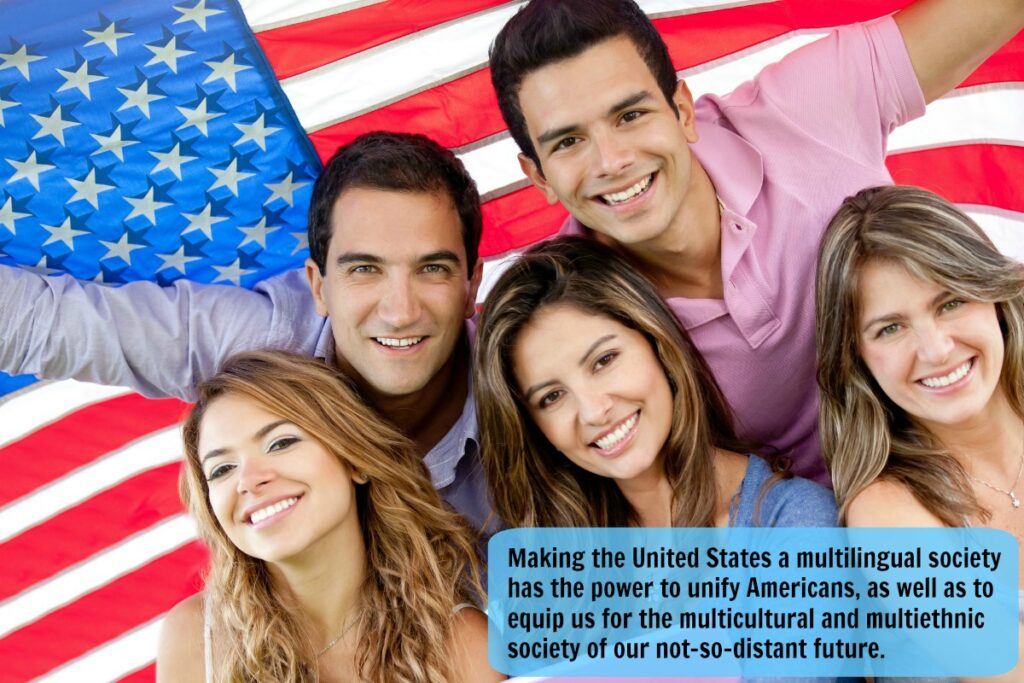
Traditionally, in the United States, there has been a common belief that speaking a foreign language is un-American—a sort of betrayal. It’s as if speaking a language other than English denies a core American value. This topic has long been contentious, dividing people. That’s why I want to talk about the unifying power of bilingualism in a nation that has long strived to be monolingual.
To better illustrate this, I need to take you to my daughter’s school playground during recess on any given day. As in any other school, you’ll find boys and girls running around, singing, and playing games. The difference here is that the children at Casa Montessori are highly diverse. For example, over the past three years, my daughter’s closest friends have included an African American, an Indian, a Caucasian, a Belizean, a Colombian, and a Japanese student.
At a glance, you might think these kids are very different from one another, and in some ways, they are. However, if you pay close attention, you’ll notice they have many things in common. One of those is that they are all American children learning Spanish as a second language! This charter school, in my opinion, is a model for how public schools of the future should look: diverse student bodies learning more than one language and learning from one another.
Beyond the obvious benefits of language learning and the social skills developed in a multicultural environment, these relationships among the children create connections among the parents. It’s like a domino effect that fosters understanding and friendship among people who might not otherwise meet. This is an undeniable example of the unifying power of bilingualism, which helps build bridges of understanding and enriches the lives of those who venture into a new language.
Making English Official, Yet Embracing Bilingualism
Before I continue making the case for the unifying power of bilingualism, I want to address the idea of English as the American unifier—the language that connects us all. The main argument is that the United States should make English its official language so the government can promote it as a symbol of unity, like the flag or the American eagle.
As an immigrant American, I agree that English should be the official language of the United States. In fact, before all the hype about this topic, many people, myself included, didn’t even know it wasn’t. I think it’s clear to everyone that English is the American language.
In my opinion, if the decision is made to make English official, it will be a confirmation of what is already commonly understood and should not impact policies that support the study of foreign languages. A great example comes from Europe, where countries as small as the Netherlands continue to speak their own official language, even if it isn’t widely spoken elsewhere. Yet, the Dutch, like most Europeans, are usually fluent in at least one other language, and in many cases, two or three.
So, should English be the official language of the U.S.? Yes. Should all Americans have access to learning a second language? Definitely yes!
It’s time for America to harness the unifying power of bilingualism to help the next generations become fluent in at least one other language. This will give them an advantage in the job market, opening up opportunities in an ever-changing economy. Bilingualism can be adopted without diminishing the primary role of English in the United States, and it has the power to unite us.
You might be wondering if, when I talk about bilingualism, I am advocating for everyone to learn Spanish as a second language. Not necessarily. The key is to embrace the teaching of various languages, focusing on those that make sense from a global economic perspective—languages that are good for business, widely spoken, and relevant within the U.S.
The key is to remove barriers and open ourselves to the world, with a genuine interest in learning about other cultures, traditions, and ways of life. By doing so, we will be better prepared to interact and understand each other here at home, closing the gap in national understanding. People from different backgrounds will not feel so foreign or unknown; we will be able to engage in dialogues and ask questions directly.
Making the United States a multilingual society has the power to unify Americans and equip us for the multicultural and multiethnic society of our not-so-distant future.
What Can We Do?
There are two things we can all do to foster the necessary change toward a society more open to foreign language acquisition:
- Embark on learning a second language: You might think this is easy for me to say because I am already bilingual. But I want you to know that every significant endeavor requires commitment and effort. I started learning English when I was 20, so I didn’t grow up bilingual, and here I am, almost 20 years later, able to communicate in English. My mother learned Dutch at 45 years old—a language that is particularly challenging for a Spanish speaker—but she did it. It is possible for you, too, to learn a second language.
- Advocate for bilingual education in your district: The advantages of bilingualism for academic success are numerous and well-documented. We now know that raising bilingual children is beneficial, so our school systems need to align with this understanding. The only way this will happen nationally is if we all contact our school district officials and advocate for the implementation of immersion programs in our area. Some progress has been made with the creation of bilingual schools, but we need a concerted effort involving school districts, one by one, until bilingualism is integrated into the K-12 curriculum.
Let’s remember that proficiency in a second language is an asset—an advantage that impacts academic, cultural, social, and professional realms. We should all advocate for policies that implement bilingual education sensitively and effectively throughout the mainstream academic setting.
Leave a Reply